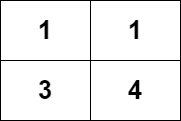You are given an m x n integer matrix grid, where you can move from a cell to any adjacent cell in all 4 directions.
Return the number of strictly increasing paths in the grid such that you can start from any cell and end at any cell. Since the answer may be very large, return it modulo 109 + 7.
Two paths are considered different if they do not have exactly the same sequence of visited cells.
Example 1:
Input: grid = [[1,1],[3,4]] Output: 8 Explanation: The strictly increasing paths are: - Paths with length 1: [1], [1], [3], [4]. - Paths with length 2: [1 -> 3], [1 -> 4], [3 -> 4]. - Paths with length 3: [1 -> 3 -> 4]. The total number of paths is 4 + 3 + 1 = 8.
Example 2:
Input: grid = [[1],[2]] Output: 3 Explanation: The strictly increasing paths are: - Paths with length 1: [1], [2]. - Paths with length 2: [1 -> 2]. The total number of paths is 2 + 1 = 3.
Constraints:
m == grid.lengthn == grid[i].length1 <= m, n <= 10001 <= m * n <= 1051 <= grid[i][j] <= 105
class Solution:
def countPaths(self, grid: List[List[int]]) -> int:
@cache
def dfs(i, j):
res = 1
for a, b in [[0, -1], [0, 1], [-1, 0], [1, 0]]:
x, y = i + a, j + b
if 0 <= x < m and 0 <= y < n and grid[x][y] > grid[i][j]:
res += dfs(x, y)
return res
m, n = len(grid), len(grid[0])
mod = 10**9 + 7
return sum(dfs(i, j) for i in range(m) for j in range(n)) % modclass Solution {
private int m;
private int n;
private int[][] g;
private int[][] f;
private static final int MOD = (int) 1e9 + 7;
public int countPaths(int[][] grid) {
g = grid;
m = g.length;
n = g[0].length;
f = new int[m][n];
int ans = 0;
for (int i = 0; i < m; ++i) {
for (int j = 0; j < n; ++j) {
ans = (ans + dfs(i, j)) % MOD;
}
}
return ans;
}
private int dfs(int i, int j) {
if (f[i][j] != 0) {
return f[i][j];
}
int res = 1;
int[] dirs = {-1, 0, 1, 0, -1};
for (int k = 0; k < 4; ++k) {
int x = i + dirs[k], y = j + dirs[k + 1];
if (x >= 0 && x < m && y >= 0 && y < n && g[x][y] > g[i][j]) {
res = (res + dfs(x, y)) % MOD;
}
}
f[i][j] = res;
return res;
}
}class Solution {
public:
const int mod = 1e9 + 7;
int countPaths(vector<vector<int>>& grid) {
int ans = 0;
vector<vector<int>> f(grid.size(), vector<int>(grid[0].size()));
for (int i = 0; i < grid.size(); ++i)
for (int j = 0; j < grid[0].size(); ++j)
ans = (ans + dfs(i, j, f, grid)) % mod;
return ans;
}
int dfs(int i, int j, vector<vector<int>>& f, vector<vector<int>>& g) {
if (f[i][j]) return f[i][j];
int res = 1;
vector<int> dirs = {-1, 0, 1, 0, -1};
for (int k = 0; k < 4; ++k) {
int x = i + dirs[k], y = j + dirs[k + 1];
if (x >= 0 && x < g.size() && y >= 0 && y < g[0].size() && g[x][y] > g[i][j])
res = (res + dfs(x, y, f, g)) % mod;
}
f[i][j] = res;
return res;
}
};func countPaths(grid [][]int) int {
m, n := len(grid), len(grid[0])
f := make([][]int, m)
for i := range f {
f[i] = make([]int, n)
}
mod := int(1e9) + 7
ans := 0
dirs := []int{-1, 0, 1, 0, -1}
var dfs func(int, int) int
dfs = func(i, j int) int {
if f[i][j] > 0 {
return f[i][j]
}
res := 1
for k := 0; k < 4; k++ {
x, y := i+dirs[k], j+dirs[k+1]
if x >= 0 && x < m && y >= 0 && y < n && grid[x][y] > grid[i][j] {
res = (res + dfs(x, y)) % mod
}
}
f[i][j] = res
return res
}
for i, row := range grid {
for j := range row {
ans = (ans + dfs(i, j)) % mod
}
}
return ans
}function countPaths(grid: number[][]): number {
const mod = BigInt(10 ** 9 + 7);
const dirs = [
[0, 1],
[1, 0],
[0, -1],
[-1, 0],
];
const m = grid.length,
n = grid[0].length;
const dp = Array.from({ length: m }, v => new Array(n).fill(-1n));
function dfs(x, y) {
if (dp[x][y] != -1) return dp[x][y];
let count = 1n;
for (let [dx, dy] of dirs) {
let i = x + dx,
j = y + dy;
if (i < 0 || i >= m || j < 0 || j >= n || grid[i][j] <= grid[x][y])
continue;
count = (count + dfs(i, j)) % mod;
}
dp[x][y] = count;
return count;
}
let sum = 0n;
for (let i = 0; i < m; i++) {
for (let j = 0; j < n; j++) {
sum = (sum + dfs(i, j)) % mod;
}
}
return Number(sum);
}
